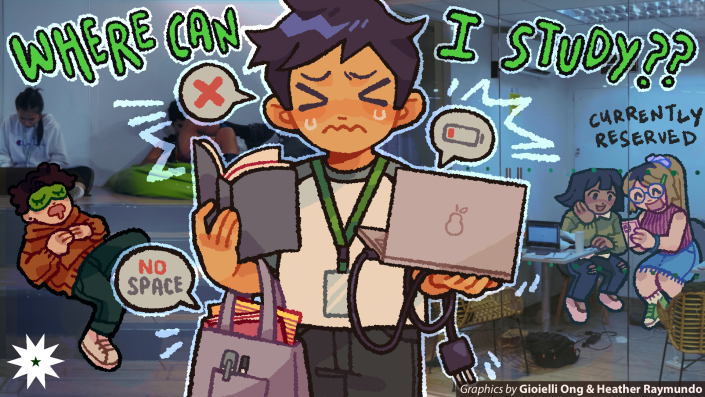Study spaces around the Manila Campus such as the Learning Commons, some unused classrooms and event spaces, and the 24/6 Gokongwei Study Hall are available to the Lasallian community. However, as the population on the campus grows, spiking to about 25,000 this academic year, so do the problems associated with the availability of these spaces. As such, students are left to battle for limited facilities, sometimes going against University policies.
Rampant hoarding
“Hoarding” complaints against the Gokongwei Study Hall’s “campers”—a moniker for students who monopolize bean bags and bring sleeping bags to discussion rooms—have only worsened since the facility’s reopening as a 24/6 facility with a remodeled space. These complaints also include those leaving valuables such as laptops and water bottles unattended for hours, sometimes days, to secure a table in the usually crowded hall.
“Since I stay here often, [I can] see how long people will stay in one area. Sometimes, they will take days. They would stay in one spot for a week [or] two. It happens frequently talaga,” Sheena* (II, BS BIO-SEC) flags. By doing this, they are “marking their territories” in the study area.
Leaving things unattended to reserve a space around the University is considered a minor offense as it violates Sections 1.19 and 5.3.2.3 of the 2018-2021 Student Handbook. The handbook specifies that the use of campus benches and tables are on the “principle of right by physical presence” and that no “reservation rights” are acknowledged for these spaces.
To discourage Lasallians from hoarding, so-called random “Clear-up Drives” that remove unattended things from benches, tables, and other study areas on campus have been spearheaded by the Student Discipline and Formation Office (SDFO). The office also reminds students of these rules through help desk announcements, social media posts, and physical flyers.
Just in early March, the office collected unattended items at the Yuchengco Hall lobby and charged its owners with a minor offense in accordance with the Student Handbook.
“From a student’s perspective, [SDFO placing unattended items in a garbage bag] only causes unnecessary anxiety, loss of trust, and harm to those who were affected,” Andrei* (II, BS-PYSC) laments, saying that the SDFO should gain the students’ trust by implementing programs and initiatives, not by “threatening them.”
To improve these initiatives, Sheena says that the SDFO should establish “a reasonable time limit as to how long a student can leave something in a study space” since there might be some who would only leave their spot for a few minutes to go to the bathroom or take care of urgent business.
The LaSallian has reached out to the Student Discipline Formation Office to inquire more about the University policies on study spaces, including the SDFO Clear-up Drive, but no response has been given as of press time.

A bigger issue
But, resolving the hoarding issue goes beyond mere setting and implementation of policies. Students acknowledge that the more significant leap that the University administration needs to take to address the hoarding issue is to open more study spaces. They believe that there would be no hoarding in the first place had there been enough
study spaces.
“Even if the SDFO said that we shouldn’t be [leaving things unattended], people couldn’t stop because sometimes, that’s the only way to claim the study spot [due to] a scarcity of it,” Sabina Omengan (IV, BS-LGL) shares.
Lasallians also recommend that more overnight facilities be opened. At present, only the Gokongwei Study Hall runs 24/6, with the Br. Andrew Gonzalez Hall lobby running at the same schedule only during midterms and finals weeks. The rest of the campus closes at 10 pm.
“They [should] allow more spacious facilities to be open, like [the] library, or at least ‘yung Andrew man lang kasi Andrew is open during midterms and finals lang. They could accommodate more students if they open the library beyond 9 pm, [but] it would require more staff and may [effect] din ‘yun sa tuition natin,” Sheena rationalizes.
Similarly, Omengan says students like the Gokongwei Study Hall because of its convenience and having a lot of seats and whiteboards, which is why replicating its setup could make other study spaces on campus “more appealing,” decongesting the overcrowded study hall.
Conflicting opinion
Amid reports about hoarding of tables and discussion rooms and concerns on the growing student population in the Manila Campus, the Office of the Vice President for Administration believes that, on the contrary, study spaces in the University remain adequate.
“Overcapacity of study areas was not observed…The utilization rate does not call for [the addition] of 24/6 study facilities,” the office comments.
The office says that they have instead acted on concerns on hoarding and ventilation within the Gokongwei Study Hall by closely working with the SDFO and by implementing projects such as the dismantling of glass walls in the discussion rooms and additional air conditioning units.
They also reassure that more projects are in the works to improve the University’s lone overnight facility for students. “The design of a comprehensive ventilation system for the entire ground floor is now in progress. Aside from [that], a botanical garden will be constructed in the area adjacent to the Gokongwei Study Facility to provide a serene environment for students to take some respite from their academic work,” the office discloses to The LaSallian.
*Names with asterisks (*) are pseudonyms
This article was published in The LaSallian‘s March 2024 issue. To read more, visit bit.ly/TLSMarch2024.
